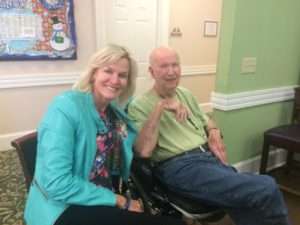
That dreaded phone call — the one where you don’t know the person at the other end of the line and he or she says, “we’re calling about your Mother.” In this case, Mother, suffering from dementia, had pulled the fire alarm and the locks on the “locked facility” had released. She walked out onto a busy street in Atlanta, GA and tried to flag down a car and escape. Luckily, a concerned motorist called the Police who called the facility. They walked two blocks and found my mother. Until that moment no one knew she was missing. That was a wake-up call.
Dementia does not mean stupid — it simply means that the mind is forgetting. Mother, a summa cum laude graduate of American University, wanted out! She took a look at her surroundings, saw the fire alarm and pulled the lever. The problem, as you can see, is that her “protectors” are not as smart. Needless to say, we moved her out and found another place for her to live. That was three years ago. Today, she has forgotten how to walk, cannot move her wheelchair and is no longer a flight risk.
If one of your family has dementia/alzhiemers it is incumbent upon you to visit the facility regularly — this alerts the staff and the person receives better care. It’s the old axiom — the squeaky wheel gets the oil. Mother is now in a Medicaid nursing home and we are more vigilant than ever. The stories we hear of horrible abuse might be rare and extreme but they’re true. I check her legs, arms, feet, cut her nails and toenails because no one else does. Mom always has new scratches and I ask about each and every one. She can barely communicate so she is at the mercy of those who attend her.
Inform the nursing home of any issues verbally and follow up with a written document. I always email what I stated verbally.
Dad is in an assisted living facility. He has his wits about him and can communicate his needs to the staff. Still, we’ve had to watch the little things — are they washing his clothes on time, changing his sheets weekly, doing the deep cleans in his room and treating him with respect. As Dad has aged he has also lost motor skills, he is a fall risk and weaker – hence the heightened vigilance. If your parents live together this becomes much easier. They watch out for each other. However, this is an exception, not the rule.
In conclusion, the workers at these facilities care about their residents but are human. It really becomes an issue of time. In a nursing home each attendant has 16 to19 patients a day to bathe, dress and feed. The private-pay locations are more vigilant than the Medicaid nursing homes BUT they also have more employees and better paid employees. I do my best to be “understanding” but, at the end of the day, it’s my Mother and Father and no one messes with them!

